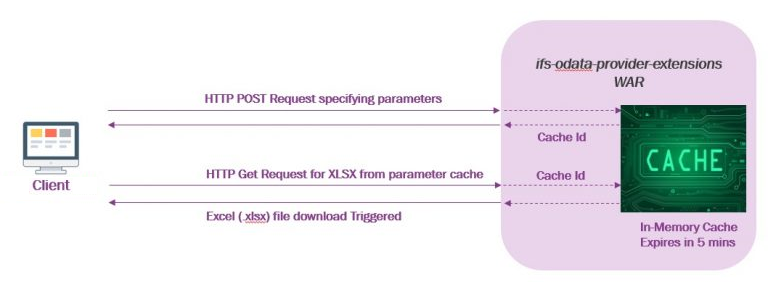| Foundation1 / Overview / Core Server / Odata Provider / Extensions / |
OData provider provides support for Excel type response format in its Export to Excel Extension. From this service, an entity collection can be exported (downloaded) as an Excel file with file type '.xlsx'.
Export to Excel extension has been exposed as a REST API end point separating it from OData provider core.
In order to generate the Excel output, a custom OOXML-Excel serializer pluggable,
developed using Apache POI - Streaming XSSF (SXSSF) API is used in-place of Apache Olingo
serializers (ODataXmlSerializer/ ODataJsonSerializer).
Generated excel file will be invalidated in 5 minutes by default or the setting specified by
-Dodp.extension.xlsx.cache.ttl.mins JVM Property
There are two ways in using this extension


In this method, a GUID is generated as the Cache Id.
After HTTP POST request, the Excel File Download from Cache URL (which is used in following HTTP GET request) will expire if it is unused. Once HTTP GET request is performed, the parameters in the cache are removed. Therefore you can put only one HTTP GET request for a corresponding HTTP POST request.
Export of following object types are supported.
The Export to Excel Extension Service of OData Provider facilitates operations such as renaming column
names of Entities/Structures (complex types), ordering columns of Entities and string concatenation
of Entity attributes.
For instance, you can concatenate two or more attributes/expanded attributes of string or integer
datatype, to one single column using expressions.
There are two main modes available in the Excel Extension as DEFAULT and STREAMED (Experimental). These can be enabled/disabled by changing the parameter EXCEL_EXTENSION_MODE which is available in the System Parameters.
Note: Both modes supports exporting Excel files containing upto 1 million rows and 16000 columns (These are the maximum limits of Microsoft Excel workbooks. See here). But the DEFAULT mode is further limited by the pod ephemeral storage limit.